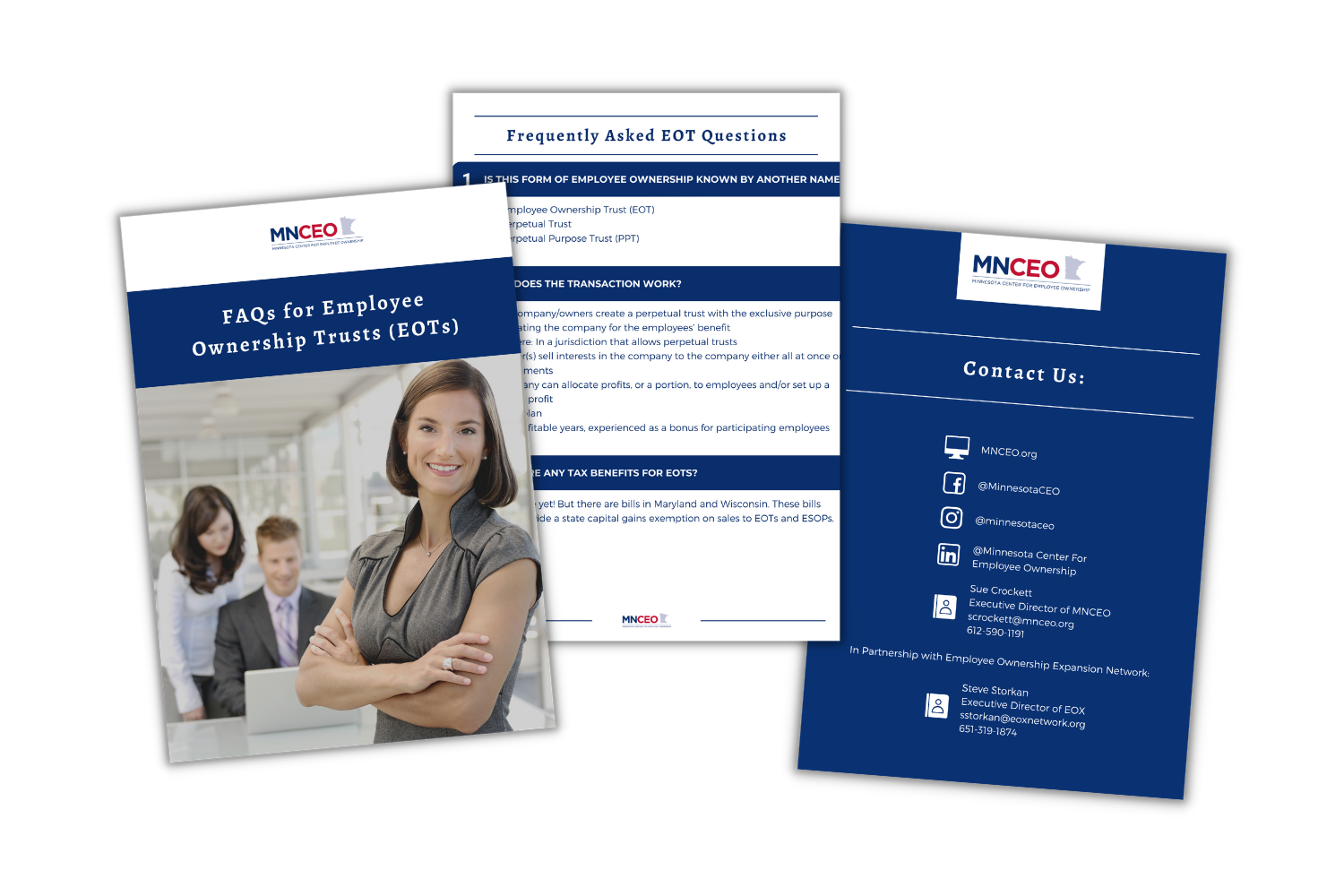
EMPLOYEE OWNERSHIP TRUST
A new form of employee ownership is the Employee Ownership Trust (EOT). These companies are owned by a perpetual trust, established by the selling owner, with the requirement that all profits above those needed for reinvestment in the business go to the employees.
An EOT succession allows a business owner to sell their company and
ensure that it will never be acquired by a larger company that closes the company, forfeiting all the local jobs, and takes technology they want or
ensure that the profits will not be siphoned off to satisfy shareholders; profits will be shared with employees and to finance the growth of the company.
EOTs lack the tax benefits of ESOPs but are also significantly less expensive to create and administer.

Employee Ownership Trust Resources
Looking for a quick bird’s eye view of Employee Ownership resources throughout Minnesota? Check out this article written by Minnesota Chamber of Commerce business owners looking for business succession support.
Learn the answers to the most frequently asked questions about Employee Ownership Trusts here!
View this table to see a basic outline of the various approaches to employee ownership. To make the table concise, there are some nuances and details left out. Follow the links to find more detailed explanations of various issues are provided where appropriate.
An Employee Ownership Trust (EOT) exists to benefit both current and future employees. With looser ties to the Internal Revenue Code and U.S. Department of Labor regulations, forming an EOT is likely to be less costly than an ESOP. Read on to read more.
Employee Ownership Trusts, a “no-hassle” form of employee ownership. According to an article published by Fifty by Fifty, an Employee Ownership Trust provides a unique opportunity not found in ESOP (Employee Stock Ownership Plans).
A feasibility study is the go-to metric analysis study for companies who are considering transitioning to an employee ownership model. An employee stock ownership plan (ESOP) can be a great way to transition your business and give back to your employees; however, it is not for everyone.
Today, the Minnesota Center for Employee Ownership (MNCEO) released new data that reveals twin crises from the Silver Tsunami coupled with COVID-19 for businesses across Minnesota.
Want to learn more about Employee Ownership Trusts (EOT)? Check out this summary to learn how an EOT is different than other employee ownership models, where EOTs came from, and what the advantages and disadvantages of EOTs are.
We are all familiar with the notorious Forbes lists. However, Forbes just published an interesting list which outlines 11 of the 100 largest privately-owned companies are in fact, employee-owned. Do you recognize any of these companies? A few might just surprise you!
During this event, the panelists discussed how selling to an employee ownership trust (EOT) should be considered as an alternative to an ESOP where the cost of an ESOP is a major consideration, as well as where perpetuity of the employee ownership structure is a major goal.
Optimax is a manufacturer of precision optics for research and industry. Optimax makes optics for NASA space programs that include the Mars Rovers, Pluto New Horizons, the Transiting Exoplanet Survey Satellite (TESS), and many more.
The Coronavirus Aid-Relief and Economic Security Act (“CARES”) enacted on March 27, 2020 contained significant provisions related to charitable deductions, providing many individual and corporate donors with greater flexibility in making gifts to non-profit organizations.
As an entire generation of Baby Boomer business owners look towards retirement, a valuable new organization has launched; the Minnesota Center for Employee Ownership (MNCEO).


EMPLOYEE OWNERSHIP IS WORTH INVESTIGATING
The next step is to get advice and learn how to start your journey to employee ownership.














